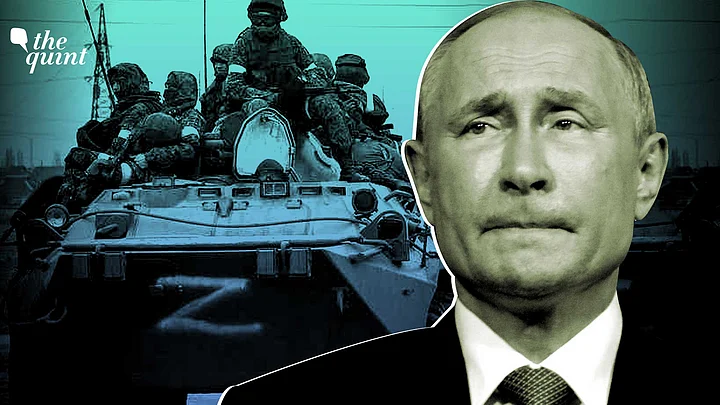Ever heard of a 'Potemkin' military?
The term "Potemkin" comes from Grigory Aleksandrovich Potemkin, a Russian military general who also served as the governor of Novorossiya, and was a favourite of Catherine the Great, who ruled the Russian empire from 1762 to 1796.
Apparently, the man constructed fake settlements in the southern parts of the empire to impress his queen. As soon as the queen completed her inspection, the settlements would be chucked away. The 'Potemkin village', therefore, is a reference to anything that has a deceptively impressive external appearance, while in reality, it is not impressive at all.
Russia's military, given its abysmal performance in Ukraine, has led many analysts and theorists to debate and label it as a 'Potemkin' military, one that looks intimidating and awesome on the outside, but is quite poor in actuality, especially in comparison to its western counterparts.
But what makes the Russian military a weak one? Here are four possible reasons-
Military Spending
The first reason is Russia's investment in its military. The country with the highest amount of military spending is the US, no surprises there. In 2021, it spent around $778 billion, 3.7 percent of its GDP.
Then comes in China which spent $252 billion on its military in 2021, which is 1.7 percent of GDP.
Is Russia next on the list? No, actually, it is India. Last year, India spent almost $73 billion on its military, around 2.9 percent of its GDP.
And then comes Russia, which spent $61.7 billion on its military in 2021, which was about 4.3 percent of its GDP.
We observe, therefore, that while Russia's share spent on the military is the highest, in absolute numbers, it is still much lower than what one would expect from a 'superpower'.
To win this war decisively, Russia will have to increase its military spending significantly because with the current one, and given the ferocity of Ukrainian resistance and the amount of military aid flowing in from the west, it could go on for a long time.
The Air Force
It has been a month since the war started, and Russia has still not achieved air superiority, something that was widely anticipated.
Billions of dollars have been used to improve Russia's air power and manufacture warplanes over the last decade, including the Su-30, Su-35, and Su-57 fighter jets, along with the Su-34 bombers, which are, as reported by The Economist, "as advanced as anything the rest of Europe has to offer".
So why doesn't Russia control the sky over Ukraine? One theory is that the Russian Air Force possesses air-delivered Precision-Guided Munitions (PGMs) in limited quantities. Russian interference in the Syrian Civil War in support of Bashar al-Assad may have depleted the already low stockpile of PGMs.
Another theory is that the relatively low number of flying hours that Russian pilots receive per year in comparison to their rivals means that Russia's air force is much less lethal than it appears.
You can read more about why Russia doesn't have air superiority over Ukraine here.
The Infantry
Michael Kofman, who is the Research Program Director in the Russia Studies Program at Center for Naval Analyses (CNA), a nonprofit research and analysis organisation located in Arlington, VA, USA, has argued that the focus of Russian military from 2008 to 2014 "was to counter Western advantages in air power … To this end, much of the investment initially did not go towards Russian ground forces", as quoted by Slate.
Investments in the military that would aid troops to launch a blitzkrieg on the ground cannot be seen in the performance of the Russian infantry in Ukraine.
There is some new equipment, yes, but it is now in the hands of the Ukrainians.
The resistance of the Ukrainian forces, the clever ambushes, and the solid new weaponry like NLAWs and Javelins have all contributed to holding off a pretty ordinary infantry sent into war by Putin.
One of the most important aspects of this is fuel and food shortages, a logistical problem that the Kremlin just doesn't seem to have thought about.
Logistics and Supply Lines
The Ukrainians have been constantly targeting the supply lines of the Russian forces and have reportedly destroyed up to sixty fuel tankers.
The low military spending has been exemplified in Russia's logistical weaknesses. One reason why the long convoy of Russian tanks outside Kyiv hasn't managed to overthrow the capital is because it is out of fuel.
Experts at a think tank known as the Institute for the Study of War in Washington DC also believe that Russia's ability to regain momentum in the war would greatly depend on the military's ability to resupply itself with the essentials.
Sameer Joshi, an ex-IAF fighter pilot, wrote a 13-point argument for the Times of India about why the Russian military is struggling.
Point number two in his article was, "Russia's forces are stretched along multiple fronts, bogged down in manpower-intensive sieges, without suitable supply lines to sustain a protracted war."
"Stretched logistics lines of communication have been tactically targeted by Ukrainians, with Russia just not being able to re-supply their forces at minimum viable rate", read Joshi's point number 13.
What Might Putin do Next?
The Russian president seems to be transforming this war into what is known as a "war of attrition", in which a belligerent grinds the enemy down by constant, devastating attacks, leading to a loss in human life (both troops and civilians) and morale.
In simple words, Russia, by inflicting enormous destruction, might stretch the war long enough for Ukraine to be drained of energy and resources, thereby being forced in capitulating.
Whether that actually ends up happening or not depends on a variety of factors such as military aid to Ukraine from the West, the morale of its troops and its people, and the performance of the Russian military itself.
(At The Quint, we question everything. Play an active role in shaping our journalism by becoming a member today.)
